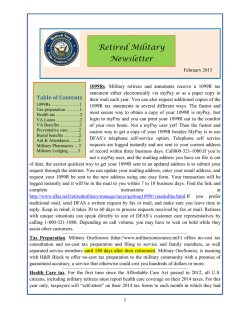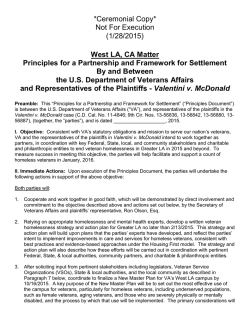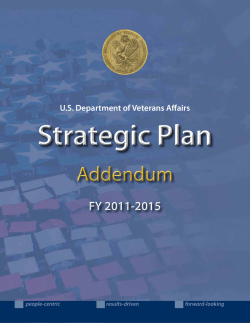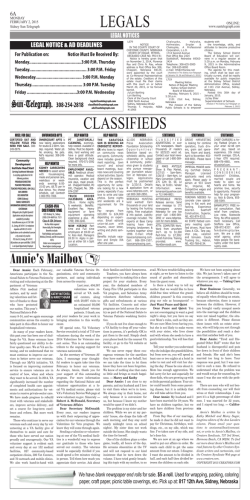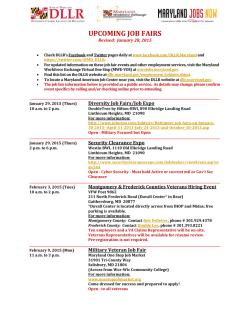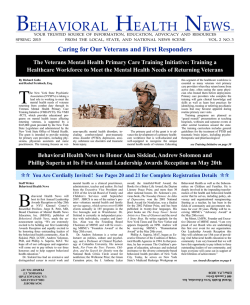
February 2015 - VVA Connecticut Chapter 120
Greater Hartford Connecticut Chapter 120 Over 31 Years of Service to Veterans February 2015 Visit Our Website at www.vva120.org Inside This Issue Chapter/State News POW/MIA News At The Capitol On The Hill Veterans Affairs News From the Service Rep’s Desk 50 Years Ago Coins on Tombstones Meetings The Chapter 120 membership meeting will be held on Thursday, February 5, 2015 at 7:00pm in the Machinists Union Hall, 357 Main St., East Hartford. The Board of Directors will meet on Thursday, February 26 at 7:00pm. Call the Chapter office for any changes in schedule. Chapter members are welcomed to attend. Notice If you have moved or changed your address, PLEASE notify us immediately. Call the Chapter office at (860) 568-9212, mail us at the address on the back of this newsletter or e-mail the Newsletter editor at [email protected]. COPYRIGHT NOTICE: In accordance with Title 17 of U. S. C. Section 107, any copyrighted work in this newsletter is distributed under fair use without profit or payment to those who have expressed a prior interest in receiving the included information for nonprofit research and educational purposes only. Report Says Air Force Reservists Exposed to Agent Orange U.S. Air Force reservists working in aircraft years after the planes had been used to spray the defoliant Agent Orange during the Vietnam War could have experienced “adverse health effects,” according to an Institute of Medicine report released Friday, January 9. After being used to spray the herbicide during the war, 24 C-123 aircraft were transferred to the fleets of four U.S. Air Force reserve units for military airlifts, and medical and cargo transport, the institute reported. From 1972 to 1982, between 1,500 and 2,100 Air Force reservists trained and worked aboard the aircraft. After learning that the planes had been used to spray Agent Orange, some of the reservists applied to the U.S. Department of Veterans Affairs (VA) for health care compensation under the Agent Orange Act of 1991. Agent Orange was widely used during the Vietnam War to clear foliage in the jungle. It contained a known carcinogen called dioxin, and has been linked to a wide range of cancers and other diseases. The VA said the reservists were ineligible for coverage because the health care and disability compensation program covered only military personnel exposed to Agent Orange during “boots on the ground” service in Vietnam. However, the reservists said some air and surface samples taken from the C-123s between 1979 and 2009 showed the presence of Agent Orange, and continued to pursue the case. The VA asked the Institute of Medicine to determine whether working in the aircraft could have posed a threat to the reservists’ health. The institute wasn’t asked to make any recommendations on the reservists’ eligibility for coverage under the Agent Orange Act. In its report, the institute said the reservists could have had some exposure to Agent Orange’s toxic chemical component TCDD, and that some reservists’ exposure could have been higher than the guidelines for workers in enclosed settings. “Detection of TCDD so long after the Air Force reservists worked in the aircraft means that the levels at the time of their exposure would have been at least as high as the taken measurements, and quite possibly, considerably higher,” committee chair Robert Herrick, a senior lecturer on occupational hygiene at the Harvard School of Public Health, said in an institute news release. ___________________________________________________________________ Never Again Will One Generation of Veterans Abandon Another The CONNECTION February 2015 CHAPTER 120 OFFICE 568-9212 Board of Directors Paul Barry Robert Burgess Peter Galgano Peter Lund Frank Zizzamia 569-3530 646-0205 828-1999 644-9770 569-0705 Executive Officers Patricia Dumin, President Jerome Blum, Vice President William Chiodo, Treasurer Roger Anderson, Secretary 620-4131 267-2981 688-2518 528-4338 VVA Service Representatives John Cutler E-Mail: [email protected] The January 2015 newsletter contained the December birthdays by mistake. So we now wish a belated Happy Birthday to members born in January and Happy Birthday to members born in February. January James G. Ashwell Andrew Crafa Henry E. Jackson Ronald P. Morin Jim Tackett Stephen Brown Arthur N. Desrosiers Samuel L. Lavoie William M. Quirk Elizabeth W. Vozzo William Coney Stanley T. Duro Helen McDonald Penny Siggia Michael E. Daugherty Kathryn M. Lechausse Ronald J. Pelletier Robert Savino Timothy M. Siggia Paul S. Egan Robert Longworth Joseph Rinaldi Earl J. Schofield Joe C. Visco 568-9212 February Gerald Fabry, MD E-Mail : [email protected] 887-1755 Gary Waterhouse E-Mail : [email protected] 656-0430 Membership Frank J. Mello, Jr. E-Mail: [email protected] Birthday Wishes 604-3879 Vernon Bertrand Michael F. Kane George T. Miller Roger Rowley Francis T. Schulze ___________________________________________________________________ Chapter/State News Women Vietnam Veterans Patricia Dumin 620-4131 Product Sales Ted Groenstein 688-5671 Newsletter/Website John Cutler E-Mail: [email protected] 282-7470 Notary Public Gary Gazdzicki, Sr. 432-0111 268-4104 Vet Centers Hartford (Area Code 860) New Haven (Area Code 203) Norwich (Area Code 860) Danbury (Area Code 203) 563-8800 932-9899 887-1755 790-4000 Derby fourth-graders’ book drive to benefit Vietnam veterans On Wednesday January 14, students at Irving School in Derby Connecticut launched a communitywide effort to benefit Vietnam veterans and their families as a way to show respect and embrace a generation of folks who for years felt abandoned by their country. Fourth-graders in the school’s reading enrichment program kicked off the book drive in the school gym, which ran through January 28. Teacher Edwin Croft said students came up with the idea to involve the entire community and asked the public to donate new or “gently used” books at various locations throughout Derby, which will benefit Vietnam Veterans of America (VVA). All Telephone Numbers are Area Code 860 unless otherwise noted Receive our Newsletter by E-Mail The monthly Chapter 120 newsletter, The Connection, is available by e-mail. Currently, 79 members receive the newsletter by e-mail, saving the Chapter over $440 in postage fees annually. The newsletter is available in Adobe format (.pdf), attached to your e-mail. If you wish to receive the newsletter via e-mail, please e-mail the newsletter editor at: [email protected] Robert Chechoski, left, of Vietnam Veterans of America Chapter 251 and Patricia Dumin, VVA state council president at the book drive. A collection box set up in the school gym was quickly filling up with the likes of Dr. Seuss’ ‘Cat in the Hat’ and ‘Curious George’ as parents attending the school’s community meeting came armed with bags full of books. Over 2,200 books were collected by January 23. Vietnam veteran Patti Dumin, president of the Connecticut State Council of Vietnam Veterans of America, was on hand for the kick-off celebration, along with fellow Vietnam veteran Bob Chechoski. The pair were thrilled to see youngsters embracing a generation who they said have often gone unrecognized. “It’s nice to see this,” said Chechoski, an Air Force veteran who served in Vietnam from 1964-1969 and is treasurer of the VVA Chapter 251 of Milford. “Now people are recognizing veterans as they should.” Never Again Will One Generation of Veterans Abandon Another The CONNECTION February 2015 Dumin, an Air Force veteran who served from 1971-1986, said the books will be distributed to veterans and their families at various VA hospitals, veterans’ centers and veterans’ houses throughout Connecticut. “I’d like to thank you for thinking of the Vietnam Veterans of America,” Dunim told the students. “When the veterans came home, they weren’t treated very nicely and they couldn’t get their benefits.” Dumin explained the VVA was formed in 1979, and today there are more than 74,000 veterans served by the organization, which offers counseling, help with benefits, housing, medical issues and more. “Our motto is ‘never again will one generation abandon another,’” Dumin added. ___________________________________ Hartford Courant Editorial - Jan.20, 2015 Naming Roads, Bridges for People Has Gotten Out Of Hand A bill has been introduced to name Route 322 in Wolcott after the late Eugene A. Migliaro Jr. He was a longtime public servant, having been a mayor of Wolcott, state representative, U.S. Marine and state commissioner of Veterans Affairs. But he was also reprimanded by the state House of Representatives in 1988 for making a derisive comment, and not his first, about gays. Do we really need to kick this beehive? And the practice is constitutionally suspect. Article 1, Section 1 of the Connecticut Constitution holds that "no man or set of men are entitled to exclusive public emoluments or privileges." We will run out of bridges and roads, even subdividing them into smaller and smaller segments, before we run out of good citizens or political chums to honor. It's fine — sometimes — to name major pieces of infrastructure after significant public figures. Let's leave it at that. Ed. Note: The bill to name Route 322 is House Proposed Bill No. 5226, Introduced by Rep. Sampson (80th Dist.) and Sen. Markley (16th Dist.), referred to the Transportation Committee. A public hearing will be held on this and other bills in the near future. CT should stop naming every road or bridge after someone we've never heard of National Convention Delegate Elections Coming in April As state officials prepare for a serious discussion about transportation policy, here's a small request: Stop naming every highway overpass, road segment or other infrastructure after groups or people most of us have never heard of. Elections for six National Convention delegates and two alternates will be held at the Chapter 120 membership meeting on April 2, 2015. Three members of the Nominating Committee will also be elected on that date. If you are interested in running for a Delegate to the National Convention to be held in Springfield, Illinois on July 21 - 25, 2015, you should start planning for your trip and consider expenses necessary to attend the Convention. Historically, the Connecticut State Council and Chapter 120 have assisted with the majority of expenses. But there is no way to know how much that financial backup will be this year. If you are interested in a Delegate position or wish to nominate a Chapter member for that position, please contact the Nominating Committee (Pete Lund, Bill Chiodo or Frank Mello). Election Rules will be posted in the March newsletter. Once, major pieces of infrastructure were named for people of statewide prominence, such as former Govs. Raymond Baldwin, Wilbur Cross and Ella Grasso. Over time, smaller bridges and roads were named after historical figures, ethnic leaders, battles, military units or veterans groups. Then, as the practice got out of hand, friends of legislators, accident victims, political contributors, state workers and relatives of state workers were so honored. Now more than 200 sections and subsections of state roads, overpasses, rotaries, tunnels and rest stops are named for some group, event or person. Twice in the past decade, legislators have tried to reform this practice, with limited success. The usual drill is that a legislator will get a request from a constituent and pass it along to the transportation committee. The committee, which entertains such proposals in odd-numbered years, puts the request on a public hearing agenda. Sometimes no one shows up to testify, but the requests are almost always approved anyway. Since there's no outreach or criteria for approval, there's a lack of consistency. Some fallen soldiers or public safety officers are honored, some are not. The Berlin Lions Club has a road, but not the Hartford Moose Lodge or the New London Elks. It depends whether someone asked. It's also possible to create a controversy where none existed — which could happen this year. Never Again Will One Generation of Veterans Abandon Another The CONNECTION POW/MIA News February 2015 From National Alliance of Families for the Return of America's Missing Servicemen – Jan. 10, 2015 Bits n Pieces Newsletter Reorganization of the POW/MIA Accounting Effort - After two months of total silence, the Department of Defense had re-engaged with POW/MIA family groups and Veterans Organizations. In a conference call/meeting on Friday January 9, 2015, Undersecretary of Defense Christine Wormuth named the interim director of the new agency. Heading the new agency, at least into the summer is Admiral Michael Franken. According to his bio, “Franken's previous flag assignments include special assistant to the director of the Navy Staff, the acting chief of staff for the Joint Staff J5, the chief of Legislative Affairs for the Department of the Navy from June 2012 to June 2014, command of Combined Joint Task ForceHorn of Africa (CJTF-HoA) from May 2011 to May 2012, and vice director, Strategy, Plans, and Policy (J5) at U.S. Central Command from July 2008 to March 2011.” Admiral Franken begins his new job on Monday January 12. Serving as interim deputy director for the new agency is General Kelly McKeague. Currently, General McKeague heads the Joint POW/MIA Accounting Command (JPAC). General Michael Linnington will serve as senior advisor to Admiral Franken and Undersecretary Wormuth. According to his bio, Linnington “graduated from the U.S. Military Academy in 1980 and was commissioned an Infantry Officer. His civilian education includes a BS from the US Military Academy at West Point, NY, and a MS in Applied Mathematics from Rensselaer Polytechnic Institute, Troy, NY. His military education includes the Infantry Officer's Basic and Advanced Courses at Ft Benning, Georgia, US Army Command and General Staff College at Ft Leavenworth, KS, and the National War College in Washington, DC where he earned a Master’s Degree in National Security Strategy.” With the appointment of Admiral Franken and his team, the Personnel Accounting Command Task Force (PACT) ceases to exist. The stand-up date of January 15, 2015, for the new organization, has slipped to the end of the month. For now, the new agency will remain headquartered in the Washington D.C. area. DOD will make a decision on a permanent headquarters location, either the D.C. area or Hawaii, next year. For the record, the National Alliance of Families is against any plan to move the headquarters for the new agency to Hawaii. We believe the Washington D.C. area is the best permanent location for the new agency. We want to be optimistic about the reorganization effort. We really do. However, we have concerns about the learning curve for this new team, as only General McKeague has any experience with the POW/MIA issue. We voiced this concern during the conference call and were assured that the new team would draw on the experience of those with decades of experience in the POW/MIA issue. Responding, we pointed out that many individuals with decades of experience in the POW/MIA issue are the very reason we are in the situation we face today. _____________________________________________________ At The Capitol From The New London Day State lawmakers discussing ways to help veterans Connecticut's veterans could receive a number of tax breaks under a host of bills proposed by state legislators this session. The 14-member Veterans' Affairs Committee presented nine proposed bills at its meeting January 22 at the Legislative Office Building in Hartford. The bills will be taken up during future public hearings expected to start in mid-February or the beginning of March. The bulk – five of the nine bills – have to do with tax exemptions for veterans. • Senate Bill 116 would increase the property tax exemption for disabled veterans in order to align the exemption with today's cost of living. • Senate Bill 202 would require the Department of Motor Vehicles, upon registration of a motor vehicle by a member of the armed forces eligible for the motor vehicle property tax exemption, to notify the municipality where the armed service member lives about the exemption in order to remove the vehicle from the municipal grand list. • House Bill 5231 would allow municipalities to establish a property tax relief program for veterans who have served on active duty for six months or longer. • House Bill 5331 would allow more veterans to claim a property tax exemption. • House Bill 5334 would allow for 10 percent of the value of any property belonging to a veteran of the armed forces who served in time of war to be exempt from taxation, and would also provide for various tax exemptions for property belonging to veterans who have been assigned a disability rating by the U.S. Department of Veterans Affairs. The other proposed bills would create a program to assist businesses owned by disabled veterans in obtaining state contracts; waive occupational licensing fees for veterans; require the commissioners of housing and veterans' affairs to assist veterans and active duty members of the armed forces in securing affordable housing; and allow for a Veterans Day observance at the Rocky Hill veterans home. Rep. Jack Hennessy, who served in the U.S. Army as a sergeant in the 1st Ranger Battalion, 75th Infantry, is serving as cochairman of the committee for the third time. Hennessy said a top Never Again Will One Generation of Veterans Abandon Another The CONNECTION February 2015 priority for him is addressing the 50 percent exemption that veterans' pensions currently receive from the state pension tax. The committee is interested in lowering the tax incrementally by 10 percent until it reaches zero. The idea is that lowering the tax will retain more of the state's veterans, who currently can be swayed to move to Massachusetts, where there is no tax on military retirement pay. Hennessy also cited the Rocky Hill veterans’ home as a priority, saying that he wants to ensure the veterans living there are given the “top notch” treatment they deserve. To that end, he also wants to make sure the committee is keeping track of the current and best practices for veterans when it comes to mental health, “a rapidly changing field,” and that “soldiers returning from combat get the best treatment.” The next Committee meeting will be held on January 29, 2015 at 1pm in Room 1E of the Legislative Office Building (LOB). Those interested in learning more details about the proposed bills or the Veterans' Affairs Committee can visit the General Assembly website, www.cga.ct.gov. Program Review and Investigations Committee to Raise Bill on Veterans' Home Study On January 23, the Program Review and Investigations Committee raised a bill concerning the Veterans' Home Study. The Bill will include recommendations 1 through 15 and 19 of the study. These recommendations include the establishment of two separate domiciliary care programs (transitional and permanent residency), veteran worker program elimination, a change in fee schedules for each residency program, encouragement for increased volunteers and enhanced activity and responsibility for the Board of Trustees. _____________________________________________________ On The Hill From Stars & Stripes Veterans advocates: Stop the VA 'hamster wheel' disability appeals process The effort to clear a massive backlog of veteran disability claims is hurting efforts to address a similar backlog in appeals of denied claims, say advocates demanding reforms to an onerous “hamster wheel” system that leaves veterans languishing for years. A congressional subcommittee hearing on Thursday January 22 focused on the appeals process, noting that the Department of Veterans Affairs has about 350,000 pending appeals of denied service-connected disability claims. “I am aware that the [VA] chose to prioritize certain initial claims in recent years, but I must say that when veterans in my district share that they waited six, eight, 10 years to resolve a meritorious appeal of a service-connected disability claim, I just find that alarming and unacceptable,” Rep. Ralph Abraham, R-La., said. Veterans wait an average 3½ years to get an initial decision and often years longer for the VA to finalize that decision. There are almost 510,000 original disability claims pending, with more than 240,000 deemed “backlogged” — meaning the veteran has been awaiting a decision for at least 125 days. When veterans’ disability claims are denied, they face another lengthy process involving multi-step appeals in which their cases often ping-pong between national and regional offices for years. VA officials have said they are aggressively working to clear the appeals backlog, but they are hamstrung in part by a complex system they are legally required to uphold. “VA recognizes that under the framework established by current law, veterans are waiting too long for final resolution of appeals,” Laura Eskenazi, vice chairwoman of the VA Board of Veterans’ Appeals, said in written testimony submitted to a House subcommittee. “VA cannot fully transform the appeals process without stakeholder support and legislative reform.” Veterans groups and advocates lined up to blast the VA appeals system at Thursday’s hearing in front of the House Committee on Veterans’ Affairs subcommittee on disability assistance and memorial affairs. “It appears the mission for some VA bureaucrats is to limit the government’s liability to our nation’s veterans by formalizing the claims and appeals processes to the point where benefits are unfairly restricted,” Jim Vale, director of the Vietnam Veterans of America veterans benefit program, said in submitted testimony. A statement submitted to the hearing by Gerald Manar, deputy director of Veterans of Foreign Wars, called on the VA to stop ignoring appeals in favor of the initial claims backlog and increase staffing on the appeals board. The Veterans Board of Appeals “has neglected large segments of other work in order to give the illusion that it is making progress on reducing its ‘workload’ — self-defined as disability compensation and pension claims — and its ‘backlog’ — again, only disability and compensation and pension claims,” according to his testimony. In submitted testimony, Bart Stichman, a prominent veterans’ attorney and joint executive director of the nonprofit National Veterans Legal Services Program, decried the “hamster wheel” that veterans get caught in, even after their appeals appear to have been resolved. “There’s a duty to assist the veteran but not a duty to sabotage the claim,” he said. He laid out a five-point plan to reform the process, including prohibiting the Board of Veterans’ Appeals and VA regional offices from pursuing negative evidence against a claim after veterans have shown sufficient evidence to support their claims. Never Again Will One Generation of Veterans Abandon Another The CONNECTION February 2015 Lawmakers at Thursday’s hearing said the VA and Congress must act now. reviews of any suicide data it submits to ensure it is complete and current. “We need to take action so we don’t get too far behind so we’re not having this exact same hearing two years from now,” Rep. Dina Titus, D-Nev., said. _____________________________________________________ Agent Orange report comes after years of VA denials Veterans Affairs News GAO report faults VA suicide data, tracking of veterans at risk Despite heightened awareness of military suicides, the Department of Veterans Affairs is incorrectly reporting suicide data and does a poor job of tracking and caring for vets at risk who are prescribed antidepressants, according to a report by the U.S. Government Accountability Office. The VA's protocols for treating veterans diagnosed with depression were broken, and patient and suicide data were flawed, inconsistent and incomplete, the GAO report found. Ten percent of veterans who received VA health care in the past five years were diagnosed with major depressive disorder, and 94 percent of those were prescribed antidepressants. Because of problems that may permeate its record-keeping, the VA may understate the prevalence of major depressive disorders among veterans being treated at the VA. Investigators reviewed 30 medical files for veterans prescribed antidepressants following a major depression diagnosis at VA medical centers in Phoenix; Philadelphia; Canandaigua, N.Y.; Gainesville, Fla.; Iowa City, Iowa; and Reno, Nev., from 2009 through 2013. Twenty-six of those veterans weren't assessed after four to six weeks, the time specified in the VA's clinical practice guidelines, and 10 veterans did not receive follow-up care within the time frame recommended, the audit found. The accuracy of veteran suicide data used for prevention work also was cited as "not always complete, accurate, or consistent," the report found. Forty out of 63 Behavioral Health Autopsy Program reports had incomplete data, six had incorrect dates of death and nine reported an incorrect number of outpatient mental health visits in the last 30 days. The errors were attributed to varying interpretations of the guidance given for filling out forms, which also were not generally reviewed at any level in the VA. In response to the report, the VA said it will review its diagnostic patterns looking at depression and said it will ask for additional A new Institute of Medicine report that found veterans were exposed to Agent Orange while flying in C-123 aircraft after the Vietnam War came three years after another federal agency reached a similar conclusion. But despite a pronouncement in January 2012 by the Agency for Toxic Substance and Disease Registry that these crews’ levels of exposure to dioxin were 182 times higher than acceptable amounts, representing a 200-fold risk for cancer, the Veterans Affairs Department refused to acknowledge any link between the veterans' current illnesses and a history of serving on that aircraft. Instead, VA public health officials insisted that trace amounts of dioxin on internal aircraft surfaces were not “biologically available for skin absorption or inhalation because dioxin is not water- or sweat-soluble and does not give off airborne particles.” Meanwhile, since veterans found out in 2011 they may have been exposed, at least 10 with diseases associated with Agent Orange have had VA disability claims denied and some have died — although just how many have passed away as a result of exposure-related illnesses is difficult to pin down, said retired Air Force Maj. Wes Carter, founder of the C-123 Veterans Association. Carter said that between 1,500 and 2,100 veterans flew the aircraft, used during the Vietnam War to spray the highly toxic defoliant and then kept in service for almost a decade after the conflict. He said his association knows of fewer than a handful of veterans whose claims have been approved, including just one who triumphed without having to file an appeal. “[The numbers] are terribly vague. We scattered decades ago, and unlike many Navy folks, had no ship's association to keep us in touch. We want to simply say that there has been death and suffering,” said Carter, a C-123 medical services officer who is among those whose claims were denied. VA’s fight to deny health treatment and claims to what may amount to a small number of former service members comes as no surprise to veterans organizations and lawmakers who have pushed VA for years to recognize certain environmental exposures. From potential harm posed by depleted uranium, burn pits, tainted anthrax vaccines, anti-malarial medication, the water supply at Camp Lejeune, North Carolina, an incinerator at Atsugi Naval Air Station, Japan, and more, VA's approach regarding illnesses related to environmental pollution has been “delay, deny, wait 'til they die,” said Rick Weidman, legislative director for Vietnam Veterans of America. “We don't pay VA to be veteran antagonists, and we don’t expect them to be advocates for the cause. What we expect is they be fair and neutral arbiters who have the best interest of veterans at Never Again Will One Generation of Veterans Abandon Another The CONNECTION February 2015 heart,” Weidman said. “But that's not what happened here. It's not what usually happens.” As part of its ongoing efforts to study Agent Orange, VA awarded a $600,000 contract in 2012 to researchers to develop a directory of exposures and paid IOM $500,000 to look specifically at the C-123 issue. The amount spent on issues that already have been examined and supported by “widely accepted science” vexes Sen. Richard Burr, R-N.C., whose office has worked since 2011 on the C-123 issue. “The VA’s delay has gone on long enough. IOM’s report confirms what the VA already knew: C-123 crew members were exposed to dangerous levels of Agent Orange. Instead of ... commissioning an expensive study of [already] well-founded science, the VA could have been caring for these veterans,” Burr said. In 2001, VA established the War Related Illness and Injury Study Center to provide care for service members with complex medical cases and medically unexplained illnesses. The center provides environmental exposure assessments and medical evaluations to veterans with difficult-to-diagnose symptoms related to deployment. But not everyone who served in the military is eligible to be seen at the WRIISC, including many of the C-123 veterans who don’t meet a requirement that they be combat veterans. Weidman said it should be up to VA to get veterans in the door and help them instead of denying them care for what he calls “toxic wounds.” Rick Weidman, VVA Legislative Director “The question is to get health care to these veterans who were exposed. These people are sick right now. They can’t afford health care, they are too sick to work, they’ve lost their jobs. The [VA] secretary has the authority to immediately grant them access to care,” Weidman said. According to VA officials, the department has set up a working group to review the IOM report and is moving forward to respond. Weidman said he hopes the findings by IOM will help pave the way for other veterans with exposure-related illnesses to get help at VA. “The C-123s were the canary in the coal mine. If [VA] could have gotten away with it, they would have kept doing it to Gulf War vets, Iraq and Afghanistan veterans and any other young people who have been exposed to environmental toxins or will be exposed,” Weidman said. Burr Releases Statement Following Report on Post-Vietnam Agent Orange Exposure in C-123 Aircraft “The IOM’s report concurs with earlier findings from the CDC, which found that the contamination during that ten-year period would have posed a significantly higher health risk for Air Force Reserve personnel,” noted Sen. Richard Burr (R-N.C.) in a January 13 statement after reviewing the report by the Institute of Medicine (IOM), which examined the potential that C-123 aircraft flown and maintained by Air Force Reserve crews from 1972 to 1982 were contaminated by Agent Orange residue from their service in Vietnam and that those crews and maintainers were likely exposed to unsafe levels of Agent Orange dioxin. “The VA's delay has gone on long enough. IOM’s report confirms what the VA already knew: C123K crewmembers were exposed to dangerous levels of Agent Orange. Instead of ignoring widely accepted science for three years and then commissioning an expensive study of that well-founded science, the VA could have been caring for these veterans. They now have what they need to start helping these veterans,” said Senator Burr. “I know Chairman Isakson will continue to pursue this issue and ensure these post-Vietnam veterans are treated to the same standard as other veterans exposed to Agent Orange.” _____________________________________________________ From the Service Rep’s Desk Standard Claims and Appeals Forms Beginning March 24, 2015, a new VA rule will require that all claims governed by VA’s adjudication regulations be filed on standard forms prescribed by the Secretary, regardless of the type of claim or posture in which the claim arises. This rule eliminates the constructive receipt of VA reports of hospitalization or examination and other medical records as informal claims for increase or to reopen while retaining the retroactive effective date assignment for awards for claims for increase which are filed on a standard form within 1 year of such hospitalization, examination, or treatment. The rule also implements the concept of an intent to file a claim for benefits, which operates similarly to the current informal claim process, but requires that the submission establishing a claimant’s effective date of benefits must be received in one of three specified formats. Finally, this rule will provide that VA will accept an expression of dissatisfaction or disagreement with an adjudicative determination by the agency of original jurisdiction (AOJ) as a Notice of Disagreement (NOD) only if it is submitted on a standardized form provided by VA for the purpose of appealing the decision, in cases where such a form is provided. Although a standardized NOD form will only initially be provided in connection with decisions on compensation claims, VA may require a standard NOD form for any type of claim for VA Never Again Will One Generation of Veterans Abandon Another The CONNECTION February 2015 benefits if, in the future, it develops and provides a standardized NOD form for a particular benefit. capacity. By leaving a quarter at the grave, you are telling the family that you were with the solider when he was killed. The VA says that the purpose of this rule is to improve the quality and timeliness of the processing of veterans’ claims for benefits. But many if not all veteran advocates disagree. _____________________________________________________ According to tradition, the money left at graves in national cemeteries and state veterans cemeteries is eventually collected, and the funds are put toward maintaining the cemetery or paying burial costs for indigent veterans. 50 Years Ago In the US, this practice became common during the Vietnam War, due to the political divide in the country over the war; leaving a coin was seen as a more practical way to communicate that you had visited the grave than contacting the soldier's family, which could devolve into an uncomfortable argument over politics relating to the war. Feb 8 – First U.S. Air Force strike against North Vietnam. In the first action of Operation FLAMING DART, an F-100 Super Sabre flew cover for attacking South Vietnamese fighter aircraft, suppressing ground fire in the target area. Feb 10 – Hotel in Qui Nhon bombed by Viet Cong. Viet Cong blow up a hotel in Qui Nhon. The blast kills 23 American servicemen. Feb 16 – Vung Ro Bay incident provides justification for Operation Market Time. The discovery of a 100-ton North Vietnamese trawler unloading munitions on a beach in South Vietnam’s Vung Ro Bay provides justification for Operation Market Time, a combined U.S. Navy/Vietnam Navy coastal patrol operation designed to stem the flow of supplies by sea from North to South Vietnam. During the next seven years, the coast patrol vessels and aircraft of Market Time would thwart nearly all infiltration by North Vietnamese Navy steelhulled trawlers. Feb 25 – First elements of the Republic of Korea Assistance Group, Vietnam (Dove Unit) arrive. The Republic of Korea Military Assistance Group, Vietnam, also known as Dove Unit, arrives in Vietnam. It is composed of 2,416 men from the Korean construction support group; the Korean Marine Corps engineer company, Korean Navy LSTs and LSMs, and a Korean Army security company. Some Vietnam veterans would leave coins as a "down payment" to buy their fallen comrades a beer or play a hand of cards when they would finally be reunited. The tradition of leaving coins on the headstones of military men and women can be traced to as far back as the Roman Empire. _____________________________________________________ Membership Renewals Is your membership renewal about to become due? Please renew today so you can continue to receive the Chapter newsletter, as well as the VVA Veteran! And as you renew, please consider joining the other 172 members who have chosen Life membership. You must submit a copy of your DD214 to qualify for Life membership. _____________________________________________________ Coins Left on Tombstones While visiting some cemeteries you may notice that headstones marking certain graves have coins on them, left by previous visitors to the grave. These coins have distinct meanings when left on the headstones of those who gave their life while serving in America's military, and these meanings vary depending on the denomination of coin. Vietnam Veterans of America, Inc. Greater Hartford Chapter 120 P.O. Box 4136 Hartford, CT 06145 A coin left on a headstone or at the gravesite is meant as a message to the deceased soldier's family that someone else has visited the grave to pay respect. Leaving a penny at the grave means simply that you visited. A nickel indicates that you and the deceased trained at boot camp together, while a dime means you served with him in some Never Again Will One Generation of Veterans Abandon Another
© Copyright 2026

